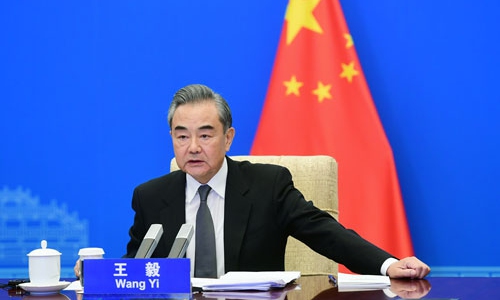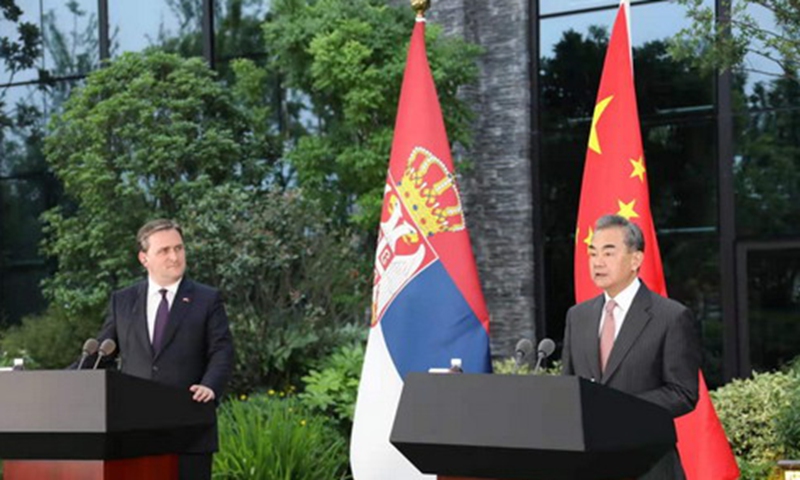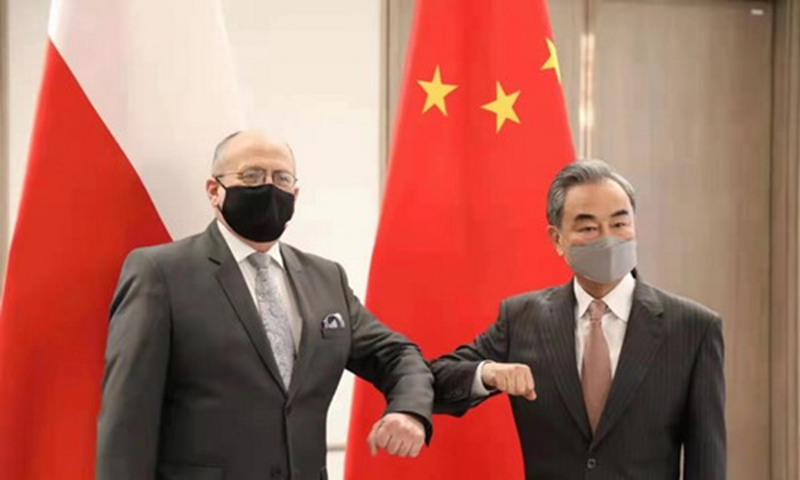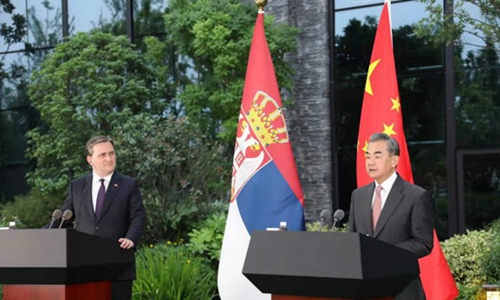Foreign ministers’ trips to China create positive synergies amid China-EU conflicts
Eyeing cooperation reflects fundamental tone for China-EU being cooperative, not competitive

Wang Yi
In spite of recent tensions between the EU and China over a number of issues such as human rights and the bilateral investment deal, Chinese State Councilor and Foreign Minister Wang Yi met several European ministers during the weekend - the first face-to-face meetings since the European Parliament froze the highly expected EU-China Comprehensive Agreement on Investment (CAI).
An important message was unleashed at the meetings in Guiyang, capital of Southwest China's Guizhou Province, according to some Chinese experts, that cooperation between China and Europe echoes the core interests of the majorities from the two sides, and that there are essential factors inside the EU in wrestling to meet this goal, which also need to be amplified.

Chinese State Councilor and Foreign Minister Wang Yi (right) Wang Yi and Serbian Foreign Minister Nikola Selakovic Photo: website of Chinese Foreign Ministry
Wang emphasized during a meeting with Serbian Foreign Minister Nikola Selakovic that whether it is bilateral relations, China-Central and Eastern European countries (CEEC) relations, or China-EU relations as a whole, they are platforms for dialogue, exchanges, and cooperation between the Chinese and European people.
China-CEEC cooperation focuses on pragmatic economic and trade cooperation, which does not involve the field of defense and security, has never had geostrategic intentions, and has no intention of engaging in any sphere of influence, the senior Chinese official said.

Chinese State Councilor and Foreign Minister Wang Yi (right) Wang Yi and Poland's Minister of Foreign Affairs Zbigniew Rau Photo: website of Chinese Foreign Ministry
Meanwhile, Wang told Poland's Minister of Foreign Affairs Zbigniew Rau that as an important part of China-EU relations, China-CEEC cooperation should be further expanded while Rau said that Poland understands and respects China's legitimate rights and interests, and is willing to make active efforts for the sound development of China-Europe relations and China-CEEC ties.
"China is a great civilization with a long history and is able to use its wisdom accumulated over thousands of years to solve various challenges in modern society as proven by its effective response to COVID-19," Rau said during the meeting.
And Serbia, an "iron-clad" friend of China, agrees to further support the China-CEEC cooperation mechanism that focuses on pragmatic economic and trade cooperation while its foreign minister attributed China's remarkable transformation to the leadership of the Communist Party of China (CPC).
"When new China was founded [in 1949], I don't know if anyone believed at that time that it would conquer Mars in a matter of 70-odd years," Selakovic said.
Wang was also due to meet the foreign ministers of Hungary and Ireland in Guiyang, according to media reports.
The meetings were held amid escalating divergences between China and the EU over a number of issues such as the halted CAI, tit-for-tat measures over China's Xinjiang-related issues, rising doubts over the China-CEEC cooperation mechanism after Lithuania vowed to quit it, and behind of all those moves, the role of Washington in influencing Brussels to take a hard-line stance toward Beijing which has put Europe in an embarrassing situation, as some expert said.
As on one hand, Europe hopes to strike a balance amid US-China rivalry, but on the other hand, a group of policymakers failed to maintain the divergences between the EU and China under a larger context of cooperation, Cui Hongjian, director of the Department of European Studies at the China Institute of International Studies, told the Global Times on Sunday.
However, unlike China-US ties, with a tone of competition gaining the upper hand, the fundamental tone for the China-Europe relationship is still cooperation, according to experts.
"Inside Europe, there are different voices about how to handle the China-EU relationship. When the European Parliament voted to freeze the CAI, some in the Council of the European Union and the European Commission disagreed," Cui said.
The positive interactions between the Chinese and the foreign ministers from the those European countries shows that the decision by the European Parliament will not be able to reflect the whole picture of the China-Europe relationship, and the latest positive synergies between the officials further expanded that point, he noted.
China and Europe are partners, not rivals, and there are opportunities rather than challenges in the China-Europe relationship. The two sides should enhance understanding via constructive dialogue, distinguish right from wrong, and remove interference and obstacles to promoting cooperation on the basis of mutual respect, Wang Yi said during the meetings over the weekend, according to the website of the Chinese Foreign Ministry.
"The visit of the four foreign ministers to China in fact shows that major countries still attach great importance to the China-Europe relationship, underscoring the vitality of the business and trade partnership between the two sides," Wang Yiwei, Jean Monnet chair professor and director of Center for European Union Studies at the Renmin University of China, told the Global Times on Sunday.
China is now Europe's largest trading partner, overtaking the US in 2020. Trade between the two sides is on average more than 1 billion euros ($1.2 billion) a day, according to official data. Reaching the CAI also strengthens the EU's position in the overall WTO reform and major multilateral negotiations, while the EU is eyeing a transition toward new energy to combat the climate crisis. China is also an indispensable partner in this sector, Wang noted.
"The decision of the European Parliament made major European countries nervous. Through these visits to China, the foreign ministers of the European countries delivered an important message that China-EU cooperation will continue gaining the momentum in the future," he said.
Ahead of the visits of the four ministers to China, Yang Jiechi, a member of the Political Bureau of the CPC Central Committee and director of the Office of the Foreign Affairs Commission of the CPC Central Committee, visited Slovenia and Croatia on May 26 and 27. Slovenia, which will assume the presidency of the Council of the EU in the second half of 2021, said it is willing to play a positive role in promoting relations between the EU and China as well as the CEEC and China, according to media reports.
"The large scale of the shared benefits between China and the Europe will continue pushing both sides to figure out how to handle their divergences while maintaining the relationship within an overall cooperative structure," Cui said.


